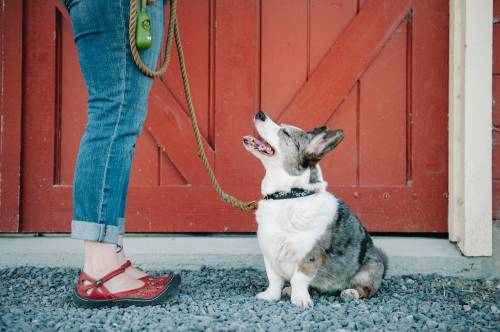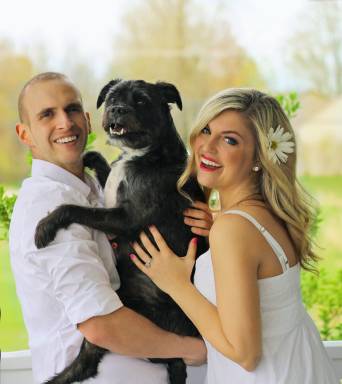Puppies—you can’t help but love them! They’re full of cuteness and look like little fur balls with legs. They’re adorable no matter what stage of puppyhood they’re at! How can you not fall in love when they look at you with those round, innocent little puppy eyes?
Connect with a verified veterinarian in minutes. Licensed vets are available 24/7 to answer your questions. No need to worry about your furry family member.
If you’re a pet parent with a new puppy, you may have a few questions about your puppy’s growth. Maybe you wonder when he’ll reach maturity, or maybe you have questions about how dogs grow in general. For instance, do small dog breeds mature slower or faster than larger dog breeds, etc. We’ve put together some information to help you figure out how long it will take your puppy to grow up, the stages he’ll go through, etc.
Puppy Growth Stages
As puppies grow and mature they go through several stages—in fact, they go through about 8 stages all together! Each dog breed, no matter the size at adulthood, goes through these 8 stages. Let’s take a look at how your puppy will change and grow in the coming days, weeks and months!
Stage 1: birth to about 13 days old: during this period, puppies are very helpless and are completely dependent on their mother for everything. They’re not able to regulate their body temperature, and they need their mother to feed them at regular intervals, along with keeping them clean and dry. Puppies at this stage will usually spend about 90% of their time sleeping, and most of their waking time nursing. What a life! During this time, it’s a good idea to begin interacting with the puppies, so they can become used to being handled and interacting with humans.
Stage 2: 13-21 days old: puppies’ senses begin to “open”, including their eyes and ears. A puppy’s ability to smell and taste will also develop during this period. Again, it’s important that the puppies have interactions with humans and become used to being handled.
Stage 3: 21 to 49 days old: at this stage, your puppy is ready to start socializing and exploring his world, though he’s still very dependent on his mom and should also spend plenty of time with his siblings. During this stage, the mother dog will begin to teach and discipline her puppies. Puppies need to stay with their family during this time, as it’s an important time for the puppy to learn how to behave and how to interact with his siblings and humans.
Stage 4: 7 to 12 weeks of age: by this time, puppies are ready to have more interactions with humans. In fact, this is the minimum age that puppies should leave their mothers. Most mothers will have weened their puppies by this time and the puppy has begun to eat puppy chow. He’s more independent and can get along on his own, with his mother’s guidance. The puppy’s personality begins to show by this stage. What cuteness—they just draw you in with their puppy ways of being and doing!
Stage 5: 12 to 16 weeks old: at this stage, puppies will try to assert themselves, bite and nip at hands, leashes, etc. By the time he reaches 16 weeks of age, the puppy’s personality is fully developed. You may notice the puppy trying to assert himself in cute ways. While his ways may be cute now, you need to remember some of the behaviors he has now will transfer to his adulthood, unless he begins to receive the proper training now.
Stage 6: 4-8 months old: this is the time when it can be more challenging to be the pet parent of a puppy. They will try your patience to the nth degree…of course they’re pure cuteness, but they will need to have some training and discipline. It won’t be easy, but this stage eventually passes, so don’t give up hope!
Stage 7: 6-14 months old: now we’ve hit the equivalence of the teen years in a puppy’s life and development. Now you’re in for fun! At this stage, puppy’s can go through unpredictable changes—think of your teen years—this is what a puppy goes through. They even go through periods of fear and bad behavior. Just be patient and love your puppy through this stage. Things will be OK and there’s hope things will soon improve!
Stage 8: 18-24 months old: by this time, your puppy enters his young adulthood period. You’ve both made it through the hardest stages! Your pup may still exhibit some teenage behavior, but will be settling down for the most part.
When Do Puppies Grow the Most?
The main growth spurt for puppies is from 3-6 months of age and they will go from looking like a puppy to a small version of the adult they’ll become. This is a fantastic and fun age for you and your puppy! It’s also a time when it will be necessary to start taking your puppy for routine vet visits and ensuring your puppy starts his vaccination schedule.
If you’re considering having your dog spayed or neutered, this usually takes place between 5-6 months of age.
It’s a good idea to check with your vet for their advice and guidance on the best age to have your pup fixed.

Review symptoms, medications & behavior to keep your pets healthy with a Vet Online in just minutes.
Ask a Vet Live NowWhen Does a Dog Stop Being a Puppy?
Now, you may wonder just when your puppy will become a full-fledged adult. That’s a good question! The short answer is it depends on the breed’s size as an adult. When do small dogs stop growing? Toy breeds, for instance, tend to grow fast and can be mature by the time they reach 6 months of age. Small to medium dogs usually reach their full size and maturity by the time they reach their first birthday. Most larger dog breeds mature between the 18-24 months of age, while giant dog breeds can continue growing for up to three years.
It’s also interesting to note that small breed dogs reach sexual and emotional maturity much earlier than the giant breeds. It largely depends on their genetics, but can also depend on their receiving proper nutrition, socialization, exercise, training, etc.
Puppy Age by Teeth
What about a puppy’s teeth—can you tell his age by his teeth? Yes—it is possible to determine a small adorable fur ball’s age by his teeth! Puppies get their teeth between 3-6 weeks of age, and then their adult front teeth come in between 12-16 weeks of age, and the back teeth will come in between 16-24 weeks.
Puppies tend to gain their canine teeth between 3-4 weeks of age, their first sets of incisors around the age of 4-5 weeks, their premolars at about 4-6 weeks of age, their third set of incisors at 5-6 weeks and their last baby molars by 6-8 weeks of age. In a puppy about 8 weeks old, it’s pretty easy to tell their age by the teeth that have come in; however, when dogs reach the age of 16 weeks, it can be quite a bit harder to determine their age. At this time, a puppy may be starting to get their adult teeth.
Puppy Teething
Talking about puppy teeth, when a puppy reaches the age of about 12 weeks, it’s teething time! Your puppy may be biting, gnawing and chewing on most anything he can get his little teeth on! Just like human babies, teething can be painful for puppies. You may notice a puppy is a bit frustrated or grumpy—just like a human baby who is teething.
It’s a good idea to make sure you have safe teething toys (made especially for puppies) available all the time when he’s going through the teething stage. Chewing and biting on things can actually relieve the puppy’s pain and help his new teeth come through. You’ll also need to make sure that all wires, electrical cords, shoes, plants, and more are all out of puppy’s reach. This can be challenging, since puppies will chew on most anything.
We’ve even heard of puppies chewing on furniture and woodwork such as windowsills—nothing is safe from puppy’s teeth!
Puppy Food & Nutrition
Once a puppy is weened, it’s important to make sure they have an excellent start with the right kind of puppy chow. They need to the proper nutrition in order to grow up into healthy adults. It might be a good idea to get your vet’s recommendations on the type of puppy chow that’s best for your puppy’s breed. You’ll also need to ask how much food your puppy will need to maintain steady, health growth. As the puppy grows, he will need an increase in the amount of food he’s eating, too.
You can choose from commercial puppy chow or even make homemade puppy food. However, if you choose to make homemade puppy food, you’ll need to ensure that the recipes include the right amounts of calories and nutrients to help your pup grow at the right rate for his breed.
Puppy Training
Can you train a puppy? The answer is yes—in fact, puppies need training! Some of the first training you’ll do is potty training. Most puppies learn quickly and are house trained by the time they’re between 4-5 months old. This can be a trying time, but don’t lose patience—just be consistent and keep up the effort. Remember, each puppy is an individual and will learn at his own rate. Once your puppy’s gained the hang of potty training, he’ll be ready to start learning basics such as staying, sitting, and down. This is a good time to teach your puppy a recall cue, teach him manners, and not to bite. Biting is a common way that puppies play with each other, but they should be taught this is not the way to play with their pet parents and families. Remember, too, that when puppies are teething and exploring their world, they do use their mouths to learn about textures, tastes, etc.
You’ll be able to start leash training your puppy by the time he’s about 16 weeks old. You can start out in the backyard, and then once he’s gotten the hang of it, take him on walks around the neighborhood and other public places. As you can see, puppyhood is a very important time of a dog’s life. It’s a time full of growing, exploring and learning about his world. Puppies are adorable little fur babies—they will need your care and guidance at each step of their growing up. We’d like to wish you and your new puppy all the best during this precious time of life!
Connect with a verified veterinarian in minutes. Licensed vets are available 24/7 to answer your questions. No need to worry about your furry family member.

Tom
Tom has always loved to write since he was little - he wanted to be either a writer or a veterinary doctor, but he ended up being a professional writer while most of his works are based on animals. He was born in San Francisco but later moved to Texas to continue his job as a writer. He graduated from the University of San Francisco where he studied biotechnology. He is happily married and a soon to be father!
Review symptoms, medications & behavior to keep your pets healthy with a Vet Online in just minutes.
Ask a Vet Live Now



